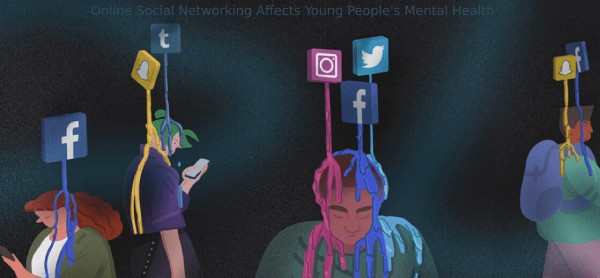Social media has evolved into a stressful environment, especially for young people. Although social media can be helpful, it can also be dangerous. Youth occasionally need help understanding the realities of social networking. Young people struggle to distinguish between reality and perception since social media relies on perception, which differs greatly from reality.
The cause for the decline in interpersonal and social engagement within families and real-world social groups is the excessive usage of social media platforms. Social media can help people connect and communicate online but can only partially replace in-person interaction.
Youth can get isolated due to a lack of engagement and rely more on social media to feel less lonely. It could be a vicious circle.
Additionally, a significant amount of content on social media platforms comprises violence and the use of abusive language, despite the numerous attempts made by social media behemoths to filter the content on their platforms. One in six teenagers in the United States encountered some abusive behaviour online, according to the Pew Research Center’s 2018 poll of youth in the country.
Teenagers’ mental health may be negatively impacted by the stuff they consume on social media, which is impossible to watch over.
Here are a few reasons why young teenagers’ mental health may suffer due to social media.
Addiction to social media
Young people spend a lot of time checking and scrolling through social media. While using social media in moderation is acceptable, you may have a social media addiction if you spend hours scrolling.
Your behaviour may be impacted by social media addiction, and you might have a persistent want to access or use social media. The signs of social media addiction are the same as any other drug use disorder, including disregard for one’s personal life, mental preoccupation, exposure to mood-altering substances, tolerance, and hiding one’s addictive behaviour. These symptoms may occur in youngsters readily swayed by social media addiction.
When teens who are social media addicts quit using them, they may experience anxiety. A study found that participants who stopped using social media showed some psychological symptoms of withdrawal.
Self-control and self-monitoring are two things that can help you overcome a social media addiction. Discussing your problem with your parents, instructors, or another responsible adult can assist if you’re a young person who is addicted to social media.
Adults who struggle with anxiety and depression can also take better care of their mental health by cutting off social media and making healthy lifestyle adjustments like exercising and eating right. The plant kratom may also aid in calming you down and regulating your anxiety. To find out about further kratom advantages, read more about it online.
A shorter attention span
At the moment, we consume an incredible amount of content every day. We now absorb five times as much information as we did in the 1990s. We only skim most of the content and information we see on social media due to the information overload. The average length of human attention has shrunk to 8 seconds.
Social media is one reason why the younger age, in general, has a shorter attention span. We constantly flip between topics due to the abundance of content on social media platforms and our desire for novelty, which ultimately shortens our attention span.
Comparing Yourself to Others
The comparison aspect of social media networks might make you feel isolated. You can find yourself comparing yourself to others more often on social media platforms, making you unhappy with your life. Social media networking site comparison can cause sad symptoms.
Online Validation Seeking
Online validation seeking is one of the major factors contributing to depression. Teenagers frequently look for approval online and believe having a particular amount of likes or followers on these platforms is necessary to fit in. Because of their constant urge to get approval online, young people can frequently feel depressed and melancholy.
Instigates Jealousy
Teenage children may become jealous if they are constantly compared. People also acknowledge feeling envious of others when they see their social media posts about vacations, costly clothing, and other purchases. Jealous teenagers can become resentful and angry and may even hate their reality.
Effects on Self-Esteem
Teenagers’ self-esteem may be impacted by excessive social media use. We are all aware of how people edit their photos with filters to make them appear in a specific way on social media. Even if it’s just for fun, it can have a negative impact on their self-esteem and cause serious body image issues. On social media, it becomes impossible to evaluate reality.
Influences Your Sleep
Addiction to social media can impact sleep patterns. Teenagers frequently check their social media accounts throughout the night and spend a lot of time on social media, which might disrupt their sleep.
People with trouble falling asleep frequently pass the time on social networking sites. The prevalence of sleeping issues may increase as a result of this behaviour.
Conclusion Social networking sites have brought us all together and given us a method to keep in touch with our friends and family. To counteract its drawbacks, finding a balance between your life and social media can be crucial.
Also read:-Children’s Health in the Digital Age: Tips



